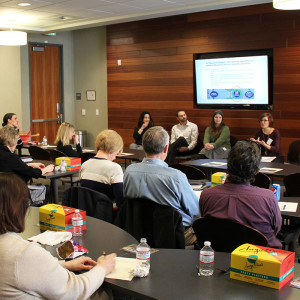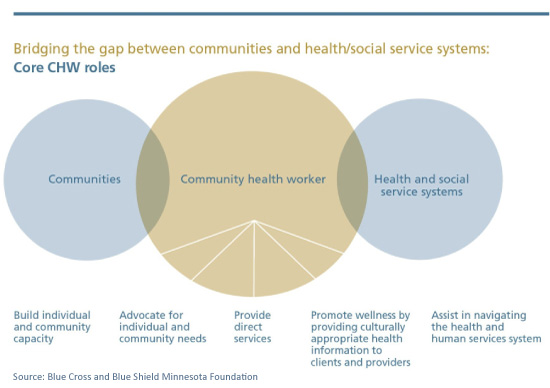Sometimes those who give money away—and this includes Community Foundations—assume that they are innately experienced at using dollars to remedy social issues. Over the years, I’ve learned that the only innate characteristic in grantmaking is privilege, and that there is an important distinction between the two.
We may have the privilege of doling out resources, but most program officers are at a deficit when it comes to recent, on-the-ground knowledge of the specific needs and populations. For this we rely on grantees. When asked, I’ll be the first to say that truly listening to grantees has made me a better program officer. Learning from grantee feedback has become common practice at the foundation, because who better to ask for advice than those you are trying to benefit.
This theme quietly and consistently surfaced throughout our first installment of North Bank Insights, an educational series being presented in partnership by the Community Foundation and Grantmakers of Oregon and Southwest Washington. This series gathers funders from Oregon and Washington to learn about incredible programs improving lives in Clark, Cowlitz and Skamania Counties. For that reason it seemed relevant to discuss affordable housing—an issue impacting both sides of the river—during our April session.

So, how did the theme of listening arise during a conversation about affordable housing? Well, because North Bank Insights focuses on the work of local nonprofits, it all ties back to an organization called the Healthy Living Collaborative (HLC). In 2015, the Community Foundation awarded the HLC a three-year, $150,000 grant to support their mission of strengthening families, neighborhoods and systems in order to ensure health equity.
Executive Director Kachina Inman led a panel discussion that explained how the HLC is utilizing a collective impact model to align policy and systems work with community-led initiatives in order to create change. In Vancouver, the HLC focused its efforts on the Rose Village neighborhood. Through community engagement, they identified and trained community health workers. These are residents who have established networks and gained trust in their community, and are more likely have a keen sense for what their neighbors need to thrive.
Robbi Kay Norman, a public policy consultant who also sat on the panel, explained that the HLC is flipping the common approach to service delivery upside down. By including these “natural helpers,” the HLC brings real-life experience into conversations with policymakers and service providers. People who utilize the services and are most affected by policy changes can then provide better insight into what services are needed and what policies have been effective in their community.
This is a powerful change for everyone involved, because they begin to understand the difference between direct experience and subject matter expertise, and how melding the two together can form better outcomes.
 Through the community engagement efforts of the HLC, healthcare professionals, nonprofit leaders and government agencies now have a direct link with real experts in
Through the community engagement efforts of the HLC, healthcare professionals, nonprofit leaders and government agencies now have a direct link with real experts in
the communities they serve, allowing them to deliver more effective services and improved outcomes. The first proof of this theory came shortly after the HLC began outreach in Rose Village, when mass eviction notices at Courtyard Village shocked tenants and brought our region’s housing crisis to the forefront of civic dialogue.
Dominique Horn, a community health worker in Rose Village, shared how she and her colleagues provided feedback that improved interventions designed by social service agencies and nonprofits. This included editing the information being sent out to residents, so that it reflected and responded more precisely to the concerns of residents. The community health workers even went door-to-door to distribute fliers and have conversations with residents. Andy Silver, Executive Director of the Council for the Homeless, said their efforts also connected many residents to the Council for the Homeless and made its efforts to rehouse tenants much more successful.
The HLC understands that people are at the center of change. So, by starting with community needs and responding with community-based strategies, they are able to effect systemic change. Bringing together partners from all sectors and combining resources and ideas to improve the lives of everyone through these strategies is the mission of the HLC. It’s a collective impact model that is best explained in the video below.
Funding collective impact work is a shift from the direct service approaches that the Community Foundation for Southwest Washington has historically supported. This approach interested our grants committee, because it promotes cross-sector collaboration and promises authentic engagement of different community voices, thus creating more equitable outcomes, actions and policies. The practice of giving community voices a place at the table was one of many highlighted by the Stanford Social Innovation Review in a lengthy feature article that said:
“ Community engagement has two significant benefits: It can achieve real change in people’s lives—especially in the lives of the most vulnerable members of a community—and it can instill a can-do spirit that extends across an entire community…Without such engagement, even the best programs—even programs backed by the most robust data—will not yield positive results, let alone lasting change. ”
For this reason, outreach to Rose Village is rooted in connections rather than rigid planning. The work is still evolving into clear policy changes as the partners work to shape goals and strategies. But, whatever they tackle, one thing is for sure: Community health workers will continue to help amplify policy and programming efforts in meaningful ways throughout the community. In turn, the HLC is opening up opportunities for professional and workforce development through training, paid positions and scholarships for community health workers.
The Community Foundation board and staff sees this program as a model for sustainable community change, and we were proud to assist HLC in sharing its efforts with other funders throughout the region.
We are already planning our next North Bank Insights, which will feature the Vancouver Public School District’s effort to build Family-Community Resource Centers into its delivery model. For more information, or if you’re a fundholder who would like to register for our next North Bank Insights, don’t hesitate to contact me or another team member at the Community Foundation directly. We’d be more than happy to hear your voice.
